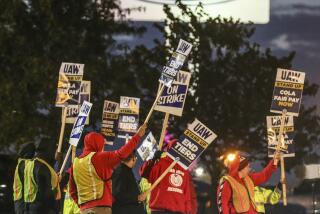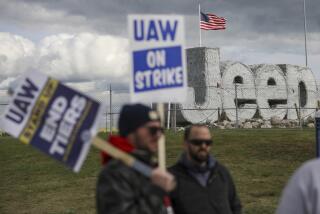Chinese factory workers go on strike as exports slow
- Share via
Reporting from Beijing — With demand for Chinese exports slowing, some factories in the nation’s industrial heartland are grappling with trouble at home: strikes by workers whose pay is shrinking.
Thousands of workers at a massive shoe factory in the southern city of Dongguan last week clashed with police as they marched to a local government office to protest loss of overtime.
The strike at the plant owned by the Taiwanese Pou Chen Group came shortly after 18 managers were laid off because of declining orders, according to the Economic Observer, a Chinese newspaper.
Earlier in the week, 1,000 workers walked out of a plant in nearby Shenzhen that manufactured computer keyboards for leading brands such as Apple and IBM. Employees said they were being forced to work long hours on weekdays so that owners didn’t have to pay overtime on Saturdays, as required by law. The company acquiesced after three days.
“People had to work so late, they couldn’t concentrate any longer,” said Zhao Xiaobing, 38, a former employee. “They will have more strikes.”
In Shenzhen, 400 workers at an underwear factory recently went on strike in a pay dispute. Employees reportedly were denied fair wages and forced to meet impossible production quotas, according to China Labor Watch, a workers advocacy group in New York.
Two other strikes took place in October, one at a Shenzhen factory owned by Japanese watchmaker Citizen Holdings Co. and one at a furniture plant in Dongguan whose boss disappeared without paying employees wages owed to them.
“There are more protests because of the economy,” said Li Qiang, executive director of China Labor Watch. “The management systems in factories are not suitable.”
Official data to be released Thursday in China could show manufacturing contracting in November after a weaker-than-expected October.
Exports grew at an annual pace of 15.9% in October, down from 17.1% in September, largely because of diminishing orders from financially troubled Europe.
Labor unrest flared in China last year as well, as workers seeking better pay walked off the job at plants operated by Toyota, Honda and Foxconn, the world’s largest electronic components manufacturer.
Many provinces responded by boosting minimum wages to head off further actions.
But it remains to be seen whether the recent spate of strikes will spread. In contrast to 2010, local governments and factory bosses may not be as willing to increase pay. Demand for Chinese goods is slackening in troubled Europe and other foreign markets. Weaker exports and a cooling real estate market are expected to slow China’s economy.
“One difference between the recent strikes and last summer’s is that, as far as I can see, this time workers are not winning big victories” such as 50% wage increases, said Geoffrey Crothall, a spokesman for China Labor Bulletin, a workers rights group in Hong Kong. “This means the domino effect of one successful strike inspiring another is not happening this time. There is a lot going on now, and I think we might have to wait a while to see what kind of picture emerges.”
More to Read
Inside the business of entertainment
The Wide Shot brings you news, analysis and insights on everything from streaming wars to production — and what it all means for the future.
You may occasionally receive promotional content from the Los Angeles Times.











